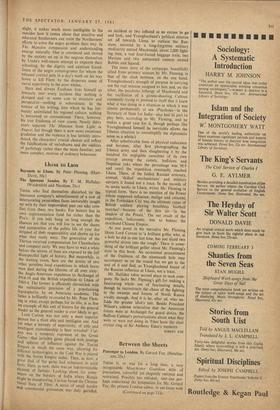Lhasa to Laos
The Ignorant Armies. By E. M. Halliday. (Weidenfeld and Nicolson, 21s.) THOSE who find themselves disturbed by the insurance company's advertisement of a row of deteriorating pensionless faces inexorably caught up with, by their improvident past can take com- fort from these two books. For history has its own superannuation fund far richer than the Pru's: if you only hang on long enough the chances are that you will live to see the shams and pomposities of the public life of your day stripped of their respectability and shown up for what they really were. The generation of the Thirties received compensation for Chamberlain and company early. We may have to wait a while before the secrets of Suez are exposed to the full disrespectful light of history. But meanwhile, in the waiting room, here are the stories of two other pointless local expeditions in which brave men died during the lifetime of all over sixty: the Anglo-American expedition to Archangel of 1918-19 and the British expedition to Lhasa of 1903-4. The former is efficiently chronicled, with the enthusiastic precision of a popularising lepidopterist, by an American academic. The latter is brilliantly re-created by Mr. Peter Flem- ing in what, except perhaps for its title, is as fine an example of this sort of history for the general reader as the general reader is ever likely to get. Lord Curzon was not only a most superior person but a most able and intelligent one. And Yet what a travesty of superiority, of able and intelligent statesmanship is here revealed! Cur- zon was a romantic exponent of the Great Game—that invisible game played with prestige and spheres of influence against the Tsarist Empire in much the same way, allowing for different technologies, as the Cold War is played with the Soviet Empire today. Then, as now, a great deal of the game had substance in solid facts. Then, as now, there was an indeterminable element of fantasy. Looking about for some- where on the borders of India where Russia might be manoeuvring, Curzon found the Chinese vassal State of Tibet. A series of small border and commercial grievances was duly paraded,
an incident or two inflated as an excuse to go and look, and Younghusband's political mission set off towards Lhasa to outface the Rus- sians, escorted by a long-forgotten military mediocrity named Macdonald, about 2,000 fight- ing men, a vast four-footed baggage train, two Maxims and two antiquated cannon named Bubble and Squeak.
The inner story of the campaign, beautifully sifted from primary sources by Mr. Fleming, is that of the clash between, on the one hand, Younghusband's strength of purpose in carrying out the real mission assigned to him and, on the other, the psychotic lethargy of Macdonald and the vacillation of a grouse-shooting Cabinet constantly trying to pretend to itself that it knew what it was doing in a situation in which it was almost permanently at sea. (Psychosis—in the Secretary of State for India—also had its part to play here, according to Mr. Fleming; and he makes a good case for it, though perhaps like Younghusband himself he inevitably allows the Tibetan situation to oversimplify the diplomatic scene as a whole.)
After unbelievable feats of physical endurance and heroism, after first photographing the Tibetan army and then slaughtering it by the hundred for negligible casualties of its own (except among the camels, buffaloes and Nepalese yaks where the percentage was 98.9 and over) the expedition eventually reached Lhasa. There, of the fabled Russian armoury, arsenal, 'skilled mechanicians' and military advisers it found not a trace. In the records of its seven weeks in Lhasa, writes Mr. Fleming in typical form, 'there is no mention of the Power whose supposed influence, malign and crescent, in the Forbidden City was the ultimate cause of British soldiers playing breathless football matches'—because of the thin air—'in the shadow of the Potala.' The net result of the expedition, ludicrously, was to bolster the moribund Chinese Empire.
At one point in his narrative Mr. Fleming likens Lord Curzon to 'a brilliant golfer who, at a hole he did in one last time, has just sliced two powerful drives into the rough.' There is some- thing of the brilliant golfer about Mr. Fleming's style in this book. An occasional presentiment of the fruitiness of the nineteenth hole may accompany us on the round but we get to the end of it and find, as Younghusband found of the Russian influence at Lhasa, not a trace.
Mr. Halliday takes second place in such com- pany. He lacks Mr. Fleming's gift for making a fascinating whole out of fascinating details, though he reconstructs the chaos of the fighting in the swamps and forests of North Russia vividly enough. And it is he, after all, who un- folds the greater idiot's tale. Beside President Wilson's solemn reiteration that the American forces were at Archangel for guard duties, the Balfour Cabinet's prevarications about what they were or were not doing in Tibet have the clear crystal ring of Sir Anthony Eden's memoirs.
ROBERT KEE










































 Previous page
Previous page